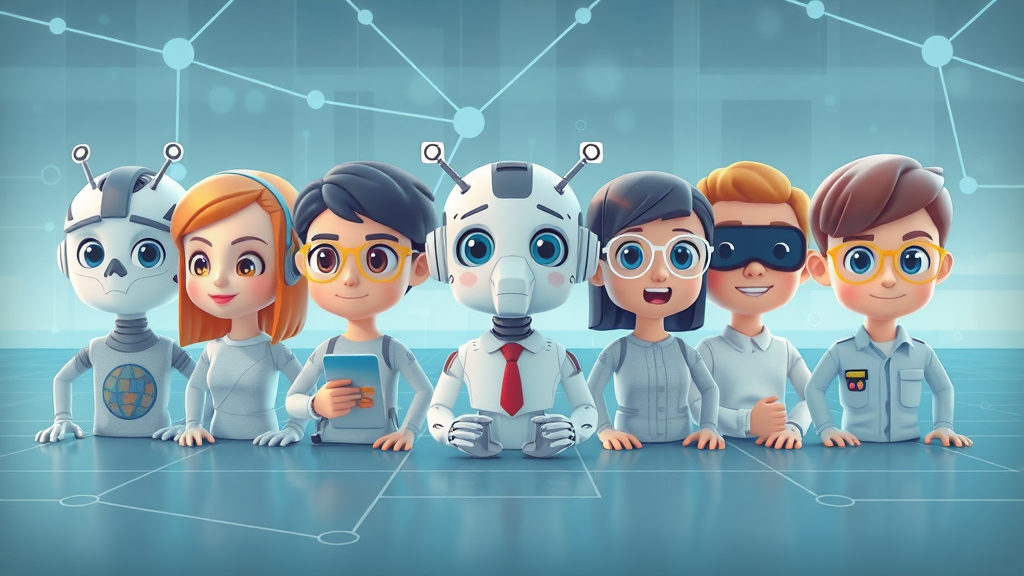
Did you know that over 75% of software dev teams plan to integrate AI development tools into their workflow by 2025—transforming how we code, debug, and innovate? If you’re ready to join the future of software development, it’s time to explore the incredible power and versatility of today’s leading AI tools. From automating repetitive coding tasks to enhancing code quality and collaboration, AI development tools are rapidly becoming the backbone of innovative development work. In this in-depth guide, we’ll reveal the top AI coding and collaboration solutions you need to try immediately—plus expert tips for optimizing your entire development process.
Revolutionizing Software Dev: Why AI Development Tools Are a Game Changer
AI development tools have completely reshaped the software development landscape, making it possible for teams to achieve unparalleled levels of efficiency and quality. These tools, which leverage large language models, machine learning, and advanced code assist, are engineered to not just speed up routine coding tasks, but also to boost code quality, reduce human error, and ensure a more scalable development workflow. Whether you’re using an AI coding assistant like GitHub Copilot or integrating automated AI agents for code review, today’s developer tool ecosystem offers unmatched benefits for solo developers and enterprise teams alike.
The integration of AI agents and generative AI into software dev is no longer a futuristic concept; it’s quickly becoming a necessity. By automating standard tasks such as code generation, review, and even pull requests, teams are freeing up valuable time for innovation. Leading organizations have reported a drop in bug rates and faster deployment cycles after introducing these AI tools. As the AI tool market continues to expand, understanding which platforms best fit your unique workflow can be the difference between lagging behind or leading in today’s tech-driven world.
"Over 75% of software dev teams plan to integrate AI development tools into their workflow by 2025 — transforming how we code, debug, and innovate."
What You’ll Learn About AI Development Tools
The top AI development tools reshaping software development
How AI coding assistants improve productivity and code quality
The difference between code generation and AI model development
Which developer tool is best for your workflow
Expert tips for optimizing your development process with AI tools

AI Development Tools: The Essential List for 2024
Selecting the right AI development tools can be overwhelming, given the explosion of platforms offering AI coding, code assist, and developer tool integrations. The tools listed below have been handpicked based on features, integration capabilities, and real-world adoption within software dev. From cutting-edge generative AI platforms to specialized code review AI agents, this list provides a comprehensive resource for teams and solo developers looking to seamlessly integrate AI into their workflows. Review the table below to easily compare top tools and identify which solution matches your current and future development needs.
Each AI tool in this list focuses on a unique aspect of the software development process. Some are all-in-one platforms offering code review, code generation, and seamless DevOps integration, while others are specialized AI agents designed for code snippet suggestions, language model training, or advanced machine learning deployment. No matter your coding stack, programming language preferences, or team size, you’ll find a tool to help you automate tedious coding tasks, ensure code quality, and supercharge your software development cycles.
AI Tool |
Main Features |
Best For |
Integrations |
Pricing |
AI Agent/Code Review |
|---|---|---|---|---|---|
GitHub Copilot |
AI-driven real-time code completion, rapid code snippets |
General programming, productivity |
Visual Studio, VS Code, JetBrains, Neovim |
Paid (with 60-day trial) |
Yes (AI code assist & suggestions) |
OpenAI Codex |
Generative AI, supports multiple languages, natural language coding |
Complex code generation, research |
API, IDE plugins, direct integration |
Paid (API usage-based) |
Yes (code review features) |
Tabnine |
AI-powered code assist, collaboration, code review |
Team coding, bug reduction |
Major IDEs, GitHub, GitLab |
Free & Paid (tiered) |
Yes (pull requests) |
Amazon CodeWhisperer |
AWS-integrated code assist, customizable workflows |
Cloud & AWS ecosystem development |
AWS IDEs, Lambda, API |
Free & Paid (usage-based) |
Supports AI agents/workflows |
DeepCode |
AI-based code review, vulnerability scanning |
Security and quality checks |
GitHub, Bitbucket, GitLab |
Paid (free tier available) |
Automated reviews |
Kite |
AI for Python code completion, documentation |
Python developers |
Major IDEs |
Free & Paid (Pro features) |
Code suggestions |
IBM Watson Studio |
ML model building, AI workflows, team collaboration |
Machine learning, enterprise |
IBM Cloud, APIs |
Paid (cloud usage-based) |
Supports custom AI models |
DataRobot |
End-to-end development, deployment, automation |
Enterprise AI solutions |
Major cloud & on-premises |
Paid (quote) |
Integrated AI agent |
Google Vertex AI |
Unified platform for ML/AI, code, deployment |
Google Cloud developers |
GCP, API, IDEs |
Paid (usage-based) |
AI agent capabilities |
Microsoft Azure AI |
Integrated AI tools, scalable deployment, code assist |
Microsoft environments |
Azure, VS Code, GitHub |
Paid (free trial) |
Supports code review/agents |

1. GitHub Copilot: The Leading AI Coding Assistant
Real-time code completion powered by AI models
Speeds up development workflow and reduces repetitive coding
Integrates natively with common software dev environments
GitHub Copilot has rapidly become the AI coding tool synonymous with productivity and innovation. Powered by large language models and trained on vast datasets of code, Copilot suggests entire code snippets and even complex logic based on your current context within your favorite IDE—including Visual Studio, VS Code, and JetBrains. This developer tool stands out for its ability to seamlessly integrate AI code assist, making common coding tasks like refactoring, boilerplate generation, and language model utilization nearly instantaneous. By learning from your patterns, GitHub Copilot not only speeds up the development process but also improves code quality through smart, context-aware suggestions.
Teams that employ Copilot have reported a substantial reduction in manual, repetitive tasks. Its integration with familiar platforms means developers can adopt AI coding practices with minimal disruption. Whether you’re managing a solo project or contributing to a large open-source codebase, Copilot’s ability to handle multiple programming languages and offer natural language explanations brings a new era of productivity to modern software development. The platform also supports AI agent features, enabling even deeper collaboration.
2. OpenAI Codex: Generative AI for Software Development
Advanced code generation for multiple languages
Supports complex development work
Enhances code review and debugging with natural language input
OpenAI Codex stands at the forefront of generative AI for software dev, redefining what AI coding can do. As the machine learning engine behind GitHub Copilot, Codex is an ai model tailored to generate, review, and even refactor code using natural language prompts. Developers can describe what they want in English, and Codex will translate those instructions into flawless code snippets in over a dozen popular programming languages. This utility enables faster code generation, simplifies documentation, and assists with debugging—essential for any dynamic development workflow.
For teams working across different stacks or experimenting with new frameworks, Codex accelerates development work by removing the steep learning curve often associated with unfamiliar programming languages. The tool’s commitment to flexibility and code quality lets you rely on AI to handle everything from simple script automation to intricate system logic. Its API and plugin support make it easy to integrate Codex into any developer tool configuration, ensuring seamless collaboration and faster delivery.

3. Tabnine: AI Tool for Collaborative Coding
AI-powered code assist for individual and team development process
Improves consistency and detection of bugs
Assists with code review and pull request optimization
Tabnine excels as a collaborative ai coding assistant, providing context-aware code completion and pull request support across entire teams. By learning from millions of public code snippets, Tabnine offers instant suggestions that boost consistency and reduce bugs throughout the development process. Unlike basic auto-complete tools, Tabnine’s machine learning engine is designed to anticipate your next line, making sure your code not only works—but follows industry best practices.
Development teams using Tabnine often see improvements in workflow speed and bug detection, particularly in large or distributed groups. The tool’s ability to track project-specific patterns enables efficient code review, streamlining pull requests, and reducing bottlenecks. Its compatibility with popular IDEs and code-sharing platforms ensures you can integrate Tabnine into your software development stack, elevating the entire team’s effectiveness and code quality.
4. Amazon CodeWhisperer: Customizable AI Coding Tool
Integrated with AWS ecosystem
Assists AI agents in automated development workflows
Accelerates software development cycles
For developers working within the AWS cloud ecosystem, Amazon CodeWhisperer is a natural fit. It provides customizable ai coding assistance, seamlessly integrating with cloud-native developer tools and enabling faster code deployment. CodeWhisperer is particularly useful for serverless architectures and microservices, where automated ai agents can handle boilerplate and infrastructure code—freeing developers to focus on core product features.
The tool streamlines development workflows by generating ready-to-use code snippets for services like Lambda, S3, and DynamoDB. It also supports ai agent integration for code review and QA, minimizing manual intervention and accelerating software delivery cycles. If your software dev relies on rapid iteration within the AWS ecosystem, CodeWhisperer will quickly become indispensable.

5. DeepCode: Real-Time AI Code Review
AI-driven code review for robust software dev
Detects vulnerabilities with generative AI models
Automates pull request quality checks
DeepCode leverages generative ai models to perform thorough, real-time code review across your repositories, making it a crucial asset for teams focused on security and code quality. The platform scans codebases for vulnerabilities and best practice violations, providing actionable feedback directly within your existing workflows such as GitHub, Bitbucket, or GitLab. Its ai agent-driven approach reduces risk, increases confidence in pull request merges, and ensures compliance standards are met.
By integrating AI review with automation, DeepCode speeds up the development workflow and minimizes manual effort. Teams appreciate its capacity to adapt to new frameworks and languages, identify nuanced bugs, and offer clear next steps for remediation. For organizations handling sensitive or large-scale software development, DeepCode is a trusted ai tool for continuous quality improvement.
6. Kite: AI Coding Tool for Python Development
AI model trained on millions of public code files
Instant code completion and documentation
Optimizes Python-focused development process
Kite serves as an AI-powered assistant specifically optimized for Python software development, utilizing a tailored ai model trained on millions of code files. It supplies intelligent code assist and real-time documentation, making it easier for developers to write, debug, and understand code fragments. Kite is compatible with all major IDEs, providing seamless code generation for common Python libraries, ensuring you’re never stuck searching for a solution mid-development.
The instant code completion feature not only accelerates project timelines but also encourages adherence to proven coding patterns. For developers who spend most of their time in the Python ecosystem, Kite’s dedicated focus provides a productivity and learning boost, making it a top ai tool for both beginners and seasoned professionals.
7. IBM Watson Studio: Building and Deploying AI Models
Comprehensive platform for machine learning and AI coding
Supports AI agents for collaborative development work
Simplifies software development management
IBM Watson Studio is a comprehensive machine learning platform built for enterprise-level software development and ai model lifecycle management. Its robust feature set includes experiment tracking, dataset organization, and multi-role collaboration for complex development work. Watson Studio’s drag-and-drop tools and pre-built ai agents simplify everything from model building and training to deployment and monitoring.
For organizations scaling their machine learning or natural language processing initiatives, Watson Studio is a go-to solution. By supporting both code-first (Jupyter, RStudio) and visual development workflows, this developer tool empowers cross-functional teams to work more efficiently while maintaining high code quality standards throughout the project lifecycle.

8. DataRobot: End-to-End AI Tool for Enterprise Software Development
Automates development workflow of advanced AI models
Code generation, deployment, and ongoing management
Ideal for large-scale development process needs
DataRobot streamlines the entire development process for advanced ai models, from code generation through deployment and management. As an enterprise-oriented ai tool, DataRobot allows teams to rapidly prototype, validate, and deploy AI-driven applications, automating the heavy lifting of feature engineering, model selection, and monitoring.
Its emphasis on explainability and transparency is especially valuable for industries with strict compliance requirements. With full-stack integrations and API support, DataRobot fits seamlessly into any modern software dev environment—empowering engineering teams to deliver production-grade AI with confidence, speed, and control.
9. Google Vertex AI: Unified AI Development Tool
All-in-one platform for code assist, AI agents, and model deployment
Streamlines the software dev lifecycle
Powerful for building generative AI solutions
Google Vertex AI is a unified platform designed to support every phase of the AI pipeline, from code assist and ai model training to deployment and monitoring. For teams building innovative generative ai apps or integrating AI into their products, Vertex AI simplifies the process, offering managed services and tools for both novice and experienced developers.
Highly regarded for its integration with Google Cloud, Vertex AI accelerates the software development lifecycle by offering scalable compute, best-in-class ML infrastructure, and native code review and AI agent features. Whether you’re running proofs-of-concept or scaling global AI-powered products, Vertex AI is proven to deliver value at every stage.

10. Microsoft Azure AI: Scalable AI Tools for Dev Teams
Integrated with Microsoft developer tool chain
Supports code review, code assist, and AI agent management
Facilitates collaborative development work
Microsoft Azure AI offers a full stack of ai tools tailored for development teams working within the Microsoft ecosystem. Its integration with Visual Studio, VS Code, and GitHub enables code assist, advanced code review, and robust ai agent workflows—all from a single pane of glass. Azure AI’s scalable infrastructure supports everything from small programming tasks to AI-powered enterprise applications.
Azure AI’s developer-first focus makes it possible to adopt AI in any size project. By supporting collaborative development work and delivering continuous updates, Microsoft ensures that developers consistently have access to the latest advancements in machine learning and ai coding.
Key Features to Look for in AI Development Tools
Real-time code generation for diverse programming languages
AI model transparency and explainability
Automated code review and pull request integration
Collaboration tools for developer teams
Custom AI agent capabilities
When evaluating new AI development tools, focus on features that address specific pain points in your development workflow. The ability to generate code in real time across multiple programming languages can accelerate delivery, especially for teams that handle diverse technology stacks. Seek out platforms that provide explainability for their ai models, so you can trust and understand automated decisions during code review and pull requests.
"Choosing the right AI coding tool boosts your team's productivity—while ensuring security and scalability for every project."

How AI Tools Enhance Every Step of the Software Development Process
Automating repetitive development workflows
Reducing bug rates with early code review by AI agents
Speeding up pull request validation and deployment
AI tools have revolutionized how developers approach the software development process, offering automation for repetitive coding tasks and manual QA checks. With ai agents handling initial code reviews and flagging common vulnerabilities, human developers can focus on high-value features and architecture. Pull request validation is now automated, ensuring only quality code merges into main branches, eliminating bottlenecks and supporting a more agile workflow.
The use of ai tools leads to earlier detection of bugs, dramatically fewer regressions, and smarter deployment strategies. By integrating code assist into daily tasks, developers increase their output while elevating code quality. As a result, teams adopting AI are more likely to ship robust, secure software in less time—a game changer for startups, enterprises, and open-source projects alike.
Expert Tips for Optimizing Your Development Workflow with AI Tools
Choose AI development tools that integrate with your tech stack
Continuously train AI agents for your organization’s unique coding standards
Monitor software dev metrics before and after AI tool adoption
For the best results, start by mapping your current development workflow and identifying integration points for AI tools. Select platforms that natively support your preferred stack—such as GitHub, Visual Studio, Google Cloud, or AWS—so teams can seamlessly adopt ai coding and ai agent capabilities without disrupting productivity. Evaluate metrics like code review turnaround times, bug rates, and deployment frequency to set a baseline for continuous improvement.
It’s also vital to train your chosen ai agents on your team’s coding standards, frameworks, and repositories. Customizing AI models for your organization ensures code suggestions are relevant and actionable. Finally, regularly review project data before and after AI tool implementation to optimize future decisions—this iterative approach will maximize both productivity and software quality.
How AI Development Tools Simplify Complex Coding Tasks
[Embed explainer video here]

People Also Ask: Top Questions About AI Development Tools
Which AI tool is best for development?
The best AI tool depends on your project needs, language preferences, and workflow. GitHub Copilot leads for real-time code suggestions and wide IDE support, while OpenAI Codex excels in advanced code generation from natural language prompts. Enterprise users may prefer Google Vertex AI or IBM Watson Studio for robust model management. Evaluate your integration needs and scalability goals to choose the right solution.
What tools are used to build AI?
To build AI, developers use platforms like TensorFlow, PyTorch, and scikit-learn for machine learning; OpenAI Codex and Watson Studio for natural language processing and large language model projects; and a range of code assist and code review tools such as GitHub Copilot and DeepCode. These tools span the entire stack—from model development to deployment and real-time code generation.
What are the 4 types of AI tools?
The main types of AI tools are: (1) AI coding assistants for code completion and generation; (2) AI code review platforms for automated quality and security checks; (3) AI agent platforms that provide automated workflows and collaboration; and (4) Machine learning model builders such as IBM Watson Studio and Google Vertex AI for training, validation, and deployment of ai models.
Should I learn Python or C++ for AI?
Python is widely considered the best programming language for AI due to its readable syntax, broad library support, and robust community. It excels in natural language processing, machine learning, and rapid prototyping. C++ is used for performance-critical applications but has a steeper learning curve. Most modern ai tools and ai coding libraries are Python-centric, making it the optimal starting point for aspiring AI developers.
FAQs on the Best AI Development Tools and Software Development
How do AI agents streamline development workflows?
AI agents automate repetitive tasks like code review, bug detection, and pull request validation, freeing developers to focus on core development work and innovation.Can AI tools be customized for specific codebases?
Yes, most AI tools allow custom model training and configuration so your ai agents align with project standards and coding guidelines.Are AI coding tools secure?
Leading vendors prioritize data security, offering features like on-prem deployment, audit trails, and GDPR compliance to protect codebases and company IP.What role does generative AI play in modern software dev?
Generative AI powers real-time code generation, automated documentation, and advanced code review, driving massive productivity gains in software development.Which platforms offer free AI tool trials for developers?
Platforms like GitHub Copilot, Tabnine, and DeepCode offer free trials or limited free tiers, making them accessible for individuals and teams looking to pilot new AI solutions.
Key Takeaways: Choosing the Right AI Development Tool
Match AI development tools to your development process needs
Evaluate integration, code review, and code assist features
Leverage AI agents to automate repetitive development work

Conclusion: The Future of Development Work with AI Tools
The future belongs to developers and organizations who embrace AI development tools today. With code, collaboration, and quality all enhanced by smart AI agents, these platforms are no longer optional—they’re the backbone of future-ready software development teams.
"AI development tools are no longer optional—they’re the backbone of future-ready software dev teams."

Mired in the Muck of Stale, Unproductive Marketing? The Marketing Landscape Rapidly Changing and You don’t Seem to be Able to Keep Pace? Don’t want to be Late to the Marketing Party? Click the Link and Get “The Ultimate Guide to AI-Powered Digital Marketing Strategies"
Sources
To further enhance your understanding of AI development tools, consider exploring the following resources:
“I tried 70+ best AI tools in 2025”: This comprehensive guide evaluates over 70 AI tools across various industries, including development, design, and content creation. It offers insights into the latest advancements and practical applications of AI tools. (techradar.com)
“Google Cloud is adding six new AI agents for devs, scientists, and power users”: This article discusses Google’s introduction of six new AI agents designed to streamline software development, data analytics, and infrastructure management by automating complex tasks. (androidcentral.com)
These resources provide valuable insights into the evolving landscape of AI development tools and their applications.
 Add Row
Add Row  Add
Add 




Write A Comment